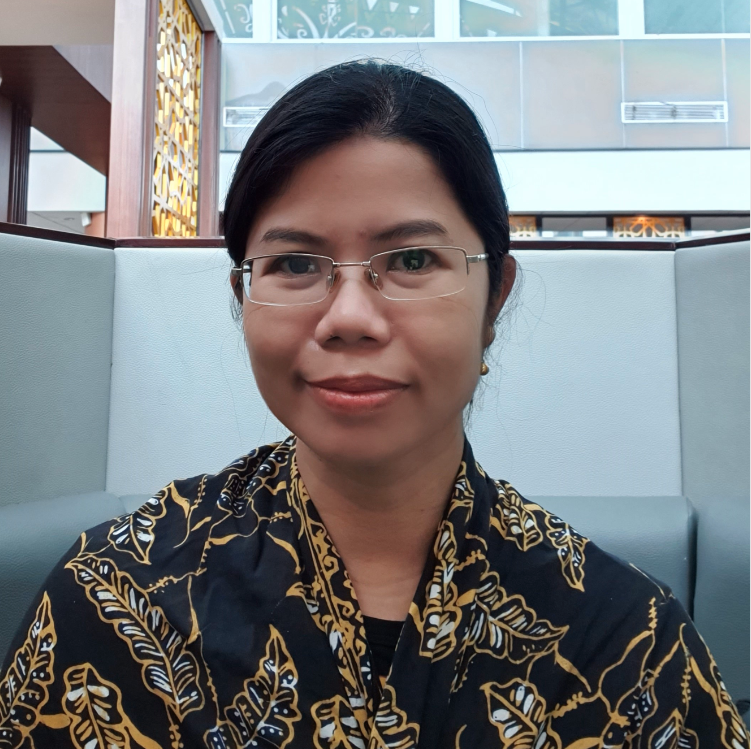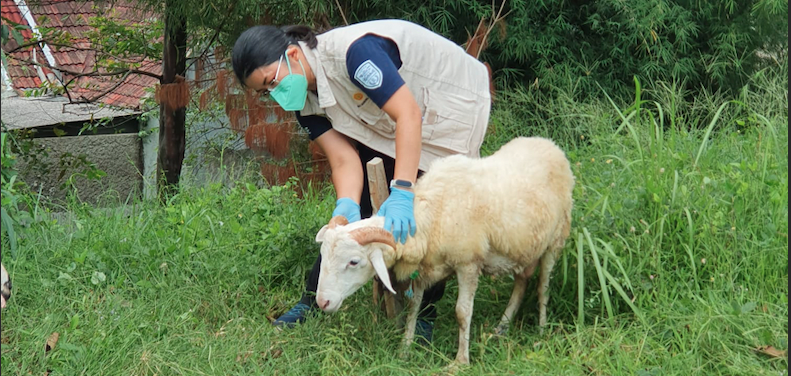Meet Dr Martha Simanjuntak
Purnama Martha Oktavia Simanjuntak,DVM, M.Si
Veterinary Officer
Sub Directorate of Animal Health Institutions and Resources, Directorate of Animal Health Directorate General of Livestock and Animal Health Services
Ministry of Agriculture, Republic of Indonesia
Can you please tell us about your work?

I work in the Directorate of Animal Health, Ministry of Agriculture, Indonesia. Previously, I was part of the department that coordinates veterinary laboratories for surveillance of animal diseases at the national level, then later moved to manage competency improvement activities for field veterinarians throughout Indonesia. I have done a lot of fieldwork, conducted training, mentored several veterinary officers, and managed several epidemiological surveillance programs.
I have responsibilities to help government veterinarians to learn and refresh their skills by conducting training, organising workshops, and taking competency assessments. The department endeavours to equip the veterinarians to provide quality animal health services, possess in-depth analytical skills related to epidemiology, and contribute to national/regional policies on animal health. It is part of my job to communicate with stakeholders such as the veterinary clinics, animal health training centres, policymakers, and non-governmental organisations in the country so that they can participate and provide support for the capacity building of veterinarians at the national level.
What is your involvement in APCOVE?
I was involved in APCOVE Indonesia from the very start of the project along with my other colleagues from Indonesia. I have contributed to managing APCOVE activities in Indonesia, especially the stakeholder consultations that involved: translating and administering questionnaires on needs assessment, conducting key informant interviews, and analysing data. I also helped develop several modules, including an introductory module on epidemiology and outbreak investigations and contributed to other modules. I have bridged the communication gap across sectors, including the Ministry of Health, Ministry of Forestry, Centre for Disease Investigation, agencies, and other parties to coordinate their involvement in the APCOVE project. I presented the preliminary findings of the stakeholder consultations in Indonesia at the Global Health Security Conference in Singapore (28 June -01 July 2022) thanks to a travel bursary. I was also involved in the training process, especially trainees’ selection and monitoring of their progress during the online training period. We created a WhatsApp group with all APCOVE trainees to monitor their learning progress and receive input from them for APCOVE development. I will also be mentoring a hands-on field project for one of the trainees.
On a personal note, I have also learnt a lot by watching and working alongside colleagues from the other vet schools in designing this program and developing the modules, observing how they approach teaching specific topics. We don’t get to discuss teaching veterinary epidemiology as often as I would like! I’m really proud of what we have achieved as a team.
Why are you passionate about the work in APCOVE?
The APCOVE project is bridging a very crucial gap to enhance the capabilities of field veterinarians in the Asia-Pacific for improved health security in the region. It has been successful in bringing training to the doorstep of the field veterinarians through online training modules, even in the challenging times of the COVID 19 pandemic. It has helped improve the abilities of the participants, and I feel proud of my contributions to this endeavour. It is a matter of pride to be part of a consortium comprising the leading epidemiologists in the world and have the opportunity to interact and learn.
The APCOVE consortium is very supportive and understanding as evident from the inclusion of the region-specific case studies. It is the first online platform in Indonesia that provides complete epidemiological knowledge, with good explanations and exercises for veterinarians on various aspects of epidemiology using comprehensive modules. I hope that the existing APCOVE modules can be utilised by the Indonesian government and universities, to disseminate epidemiology knowledge among veterinarians to enhance their capacity in the field (as continuous professional development). These modules will help field veterinarians to carry out analysis of their outbreak investigations for which there is limited data available. The experience has also provided me with the opportunity to communicate with fellow consortium members from different countries, learn new things, and how to solve problems, for example, how to present the modules in the best way so that they are easily understood by the participants. Also, when I take part in interactive sessions, I get to learn about the experiences of the participants from other countries. Thank you for the great experience with APCOVE. I hope there will be sustainability and innovation in this wonderful initiative.
